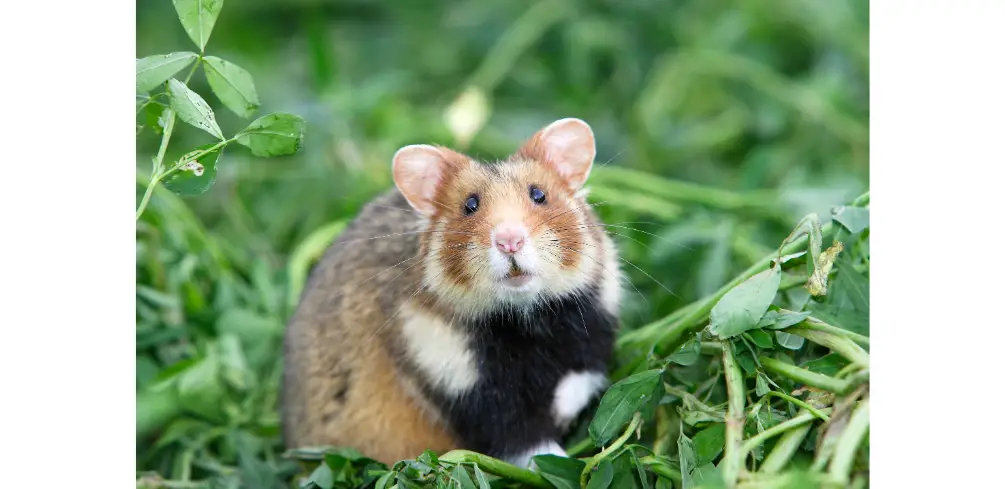You’ve just settled in for a relaxing evening at home, and suddenly you hear it – that unmistakable high-pitched squeak coming from your hamster’s cage. You can’t help but wonder, ‘Why is my hamster always squeaking?’
You’re not alone in your curiosity. Many hamster owners find themselves asking the same question as they try to decipher the meaning behind their furry friend’s vocalizations.
Fear not, fellow hamster enthusiasts! We’re here to shed some light on this intriguing behavior and provide you with the answers you’ve been seeking.
In this article, we’ll explore the various reasons behind your hamster’s squeaks, from normal communication to possible signs of distress. By gaining a better understanding of what your little pet is trying to tell you, you’ll be able to build an even stronger bond with them and ensure their happiness and well-being.
So let’s dive into the fascinating world of hamster sounds and discover what all that chatter really means!
Decoding Hamster Communication
Have you ever wondered what your little furry friend is trying to tell you with all those squeaks? Understanding hamster language may seem like a challenge, but it’s a crucial part of forming a strong bond between you and your pet.
Hamsters use various communication cues to let us know how they’re feeling, and by decoding these signals, we can better respond to their needs and emotions. So, let’s dive into the fascinating world of hamster communication!
As adorable as your hamster’s squeaks might be, they can also be informative! Squeaking is just one of the many ways hamsters express themselves. Whether it’s due to excitement, fear, or even annoyance, paying attention to these vocalizations can give valuable insights into your pet’s well-being.
By familiarizing yourself with different types of squeaks and other communication cues, you’ll not only enhance your relationship with your hamster but also ensure that they have the best possible environment tailored to their needs. Remember – a happy hamster is a healthier and more content companion!
Expressing Contentment And Happiness
One possible reason for your hamster’s constant squeaking is that they are actually expressing happiness and contentment. Hamsters, just like humans, have their unique ways of communicating emotions, and squeaking can be a sign that your little furry friend is a happy hamster.
These content critters may squeak when they’re excited about something, like exploring their environment or playing with their favorite toy. So, if you notice your hamster squeaking while engaging in activities they enjoy or while you’re interacting with them in a gentle manner, it’s likely that they’re simply letting you know how much they appreciate the moment.
Keep providing them with a comfortable habitat, nutritious food, and opportunities for exercise to maintain a healthy and joyful companion. Just remember to pay close attention to any changes in behavior or other signs of distress that might indicate an issue that needs addressing.
But for now, enjoy the delightful chatter of your contented furball!
Signaling Stress Or Discomfort
On the other hand, not all squeaks are expressions of joy. In some cases, your furry friend might be letting you know they’re stressed or uncomfortable. Hamsters can be sensitive to a variety of stress triggers in their environment, which may lead to increased vocalizations as a way to communicate their distress.
To help ease your hamster’s stress and discomfort, it’s essential to pay attention to their needs and create a comforting home for them. Consider the following comfort solutions:
- Provide ample hiding spaces: Hamsters are prey animals and feel more secure when they have places to hide.
- Add cardboard tubes or small boxes to their cage.
- Place pieces of soft fabric for them to burrow into
- Try incorporating natural materials like wood or cork for added enrichment.
- Keep noise levels low: Loud noises can easily startle and stress your hamster.
- Choose a quiet room in your house for their habitat
- Avoid playing loud music or placing the cage near noisy appliances
- Be mindful of sudden movements or loud voices around your hamster
- Maintain proper cage cleanliness: A dirty environment can negatively affect your hamster’s well-being.
- Clean the cage regularly to prevent the buildup of waste and odor.
- Replace bedding with fresh material during cleaning sessions
- Ensure food dishes are clean and water bottles are filled with fresh water
By addressing any potential stress triggers and providing comfort solutions, you’ll create a nurturing environment that should reduce those worrisome squeaks. Always remember that understanding your hamster’s behavior is key in promoting a happy and healthy life for them.
Seeking Attention Or Social Interaction
One possible reason your furry friend might be constantly squeaking is that they’re seeking attention or social interaction. Hamsters are naturally curious and active creatures, so they may be trying to communicate their desire for companionship or playtime.
Strengthening your bond with your hamster through regular handling and interaction can help them feel more secure and less inclined to squeak excessively. Engaging in hamster bonding activities like hand-feeding treats or providing toys for them to explore can also make a world of difference in quelling those persistent squeaks.
To further enhance your relationship with your beloved pet, consider setting aside dedicated playtime activities each day. This not only offers an opportunity for you to bond with your hamster but also provides them with the mental and physical stimulation they need to thrive.
You can create a fun and interactive environment by incorporating puzzle toys, exercise wheels, or even DIY cardboard mazes for them to navigate. By dedicating time for nurturing your connection with your hamster, you’ll likely notice a decrease in their squeaking behavior as they become more content and satisfied with their daily routine.
Identifying Health Issues And Concerns
While your hamster might simply be craving some social interaction, it’s essential not to overlook the possibility of underlying health issues.
A change in your furry friend’s behavior, such as increased squeaking, could be their way of communicating discomfort or pain.
To ensure their well-being, take a closer look at their living conditions and overall health.
A balanced and nutritious hamster diet is crucial for maintaining optimal health.
Make sure you’re providing a variety of fruits, vegetables, and protein sources for your pet – this can significantly impact their energy levels and mood.
Additionally, proper bedding is vital for your hamster’s comfort and happiness.
Hamsters are known to be sensitive to certain materials, so selecting the right type of bedding can make all the difference in preventing allergies or respiratory issues that could cause distress.
By paying attention to these details and addressing any concerns promptly, you’ll create an environment where your little companion thrives and feels more content.
Conclusion
In conclusion, it’s essential to pay close attention to your hamster’s squeaking as it can reveal their emotions and needs. By understanding the different meanings behind their vocalizations, you can better care for your furry friend and ensure they live a happy, healthy life.
Remember to monitor any changes in your hamster’s behavior or squeaking patterns, as this may indicate underlying health issues or concerns.
Don’t hesitate to consult a veterinarian if you have any doubts about your pet’s well-being.

